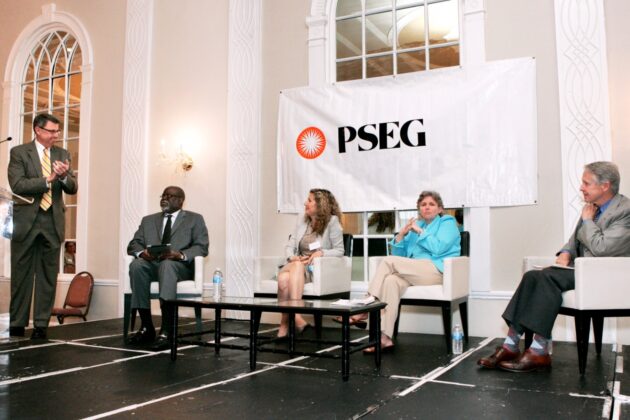As the focus of New Jersey’s response to Hurricane Sandy turns to long-term rebuilding from disaster relief, the Council of New Jersey Grantmakers’ recent annual Conference for New Jersey’s Social Sector, Our Shared Road Ahead: Sandy and Beyond came at a timely moment. The meeting, fittingly held in Asbury Park, drew a record 185 leaders from foundations, non-profits and government throughout the state. It provided participants with a rare opportunity to hear about the lessons learned by social sector colleagues and experts around the country who have grappled with how to create effective long-term philanthropic responses to catastrophic events in the absence of a readily available guide. Break-out sessions on such topics as using “patient capital” to advance philanthropic investments, working effectively with government, and getting your organization’s story told in the media further drove home the point that there is a role for every social sector member to play in restoring the health and vitality of New Jersey’s communities.
The morning’s plenary session set the stage for the day’s discussion. Three philanthropic leaders – John Grady Davies, President & CEO of the Baton Rouge Area Foundation; Edie Lutnick, President of The Cantor Fitzgerald Relief Fund; and Sherry Magill, President of the Jessie Ball DuPont Fund – spoke movingly about the challenges they encountered in the devastating aftermaths of Hurricane Katrina, the World Trade Center attacks of 9/11, and the 2011 tornadoes in Alabama, respectively. With no standard protocols in place, each readily acknowledged they were required to lead as they went along, and view sharing their learning as a necessary corollary of their experiences. Some of their key messages and insights include:
- Philanthropy can take greater risks than government. It’s not enough to build back to the status quo. Local funders have to break out of traditional funding roles and become advocates for what needs to happen.
- Invest in human capital – develop the capacity of local leaders and employees by giving them the tools and resources they need at the time they need them; allow them to guide you in understanding how your resources will best be deployed.
- In the aftermath of natural disaster, build economically representative communities in order to maximize health and resiliency and minimize pockets of extreme poverty.
- Dealing definitively with the issue of mental health is a critical need, however, the complexity of post-traumatic stress syndrome can render early intervention very expensive and ineffective. Timing is crucial.
- Philanthropy can and should play a role in stimulating dialogue about the implications of living in coastal communities.

CNJG Chairman thanks Moderator Roland Anglin, and panelists Edie Lutnick, Sherry Magill & John Davies.
Break-out sessions throughout the day straddled Sandy and non-Sandy -related topics. In the session on “patient” capital, a tool increasingly used by grantmakers to support long-term grantee work, it was refreshing to hear Jesse DuPont’s Magill emphasize the value of measuring outcomes qualitatively, especially for those grantees whose efforts aren’t completely successful. She said the most important question a funder can ask a grantee is “What did you learn?” as a means of uncovering a program’s actual impact on the lives of people it was intended to serve.
A session exploring how to drive rebuilding in non-tourist communities that lie outside of the public spotlight led Davies of the Baton Rouge Area Foundation to report that in dealing with government officials who put up roadblocks to progress, “We were aggressive and unapologetic. We made it clear that we held the highest moral ground on which to advance everyone’s lives.” In a session exploring the long-term ripple effects of Sandy on communities throughout the state, Roland V. Anglin, Director of the Joseph C. Cornwall Center for Metropolitan Studies at Rutgers and a presenter throughout the day, counseled, “Philanthropy needs to help the non-profit community do its job. Rebuilding depends on how the community comes together.”
“World Café” lunch-time conversations with designated table leaders enabled Conference attendees to engage in in-depth group discussions on specific topics. I chose to sit with Mary Mann, deputy director of New Jersey News Commons based at Montclair State University, a project spurred and supported by the Knight Foundation and the Geraldine R. Dodge Foundation as a means of creating a robust media sector in the state. A concrete model of effective philanthropy, NJ News Commons will no doubt serve our state well as a key resource for rebuilding efforts.
Abby O’Neill, a member of the Council of New Jersey Grantmakers Board of Trustees, is a trustee of the Union Foundation, based in Warren. An established strategic grantmaker in New Jersey having served as Market Development Manager for Bank of America and as Vice President Programs and Communications for the Fannie Rippel Foundation, she now assists donors and nonprofits in their strategic planning, communications and advancement.
